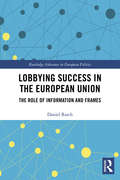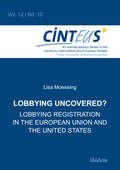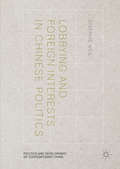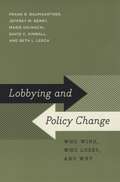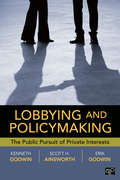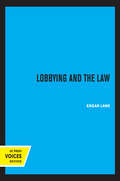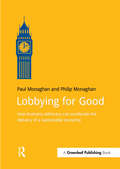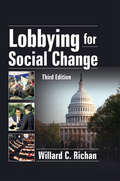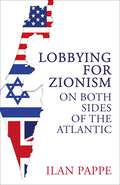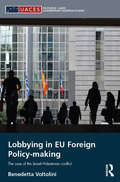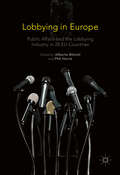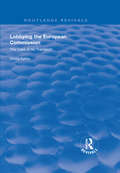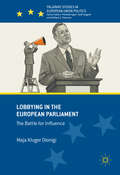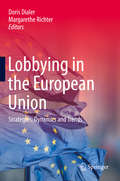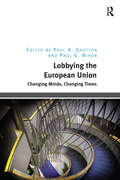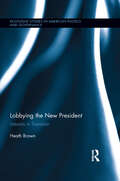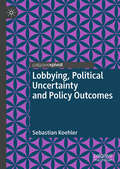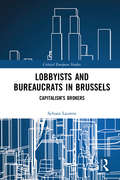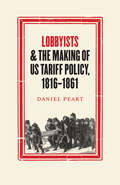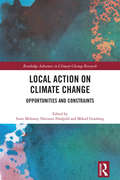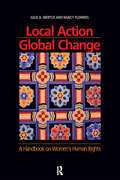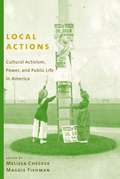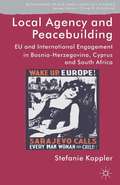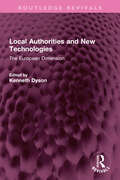- Table View
- List View
Lobbying Success in the European Union: The Role of Information and Frames (Routledge Advances in European Politics)
by Daniel RaschHaving information is key for most political decisions – both for decision-makers and societal actors. This is especially crucial in democratic countries where external stakeholders are invited to participate in decision-making pro- cesses. Assuming that every actor that gets involved in decision-making processes has a particular lobbying goal, there is a heterogeneous set of actors competing against each other to provide information to the decision-makers. This competition leads some stakeholders to be more successful in achieving their goals than others. Frames, and the framing of information, play an important role in such lobbying success. In this book, Daniel Rasch questions whether and, if so, how, information impacts lobbying success and shows how various actors perform in three instances of European decision-making. He does so by combining findings from a qualitative content analysis with the results of a cross-case analysis using the quantified qualitative data. The new dataset contains a representative sample of over 200 position papers from EU level and national consultations, press releases and evidence from national stakeholders in Germany, Sweden and the United Kingdom. Lobbying Success in the European Union effectively bridges research on interest mediation and framing studies, and offers a new model for measuring stakeholders’ success. This new and pragmatic approach to study lobbying success using a traceable and easy to use instrument can be adapted to any policy analysis and any issue.
Lobbying Uncovered?: Lobbying Registration in the European Union and the United States (An Interdisciplinary Series of the Centre for Intercultural and European Studies #12)
by Lisa MoessingTo the public's eye, lobbying is still a highly obscure trade. Lobbyists are generally perceived to work behind closed doors in order to influence legislation—what really happens is unknown to the public. To make interest representatives more visible, both the European Union and the United States have developed mechanisms to register lobbyists. However, while US legislation now forces lobbyists to register and report their influential work by fixed deadlines, the EU's registration remains voluntary due to the lack of a legal basis.This book takes the reader closer to today's concept of lobbying, especially in regard to the EU's registration mechanism. Lisa Moessing compares both the US and the EU registration systems by their technical composition, accessibility, and handling and contrasts their efficiency and effectiveness. Featuring the perspectives of lobbyists, watchdog members, and political representatives, this text outlines a starting point for improvement and emphasizes the importance of listening to those who deal with registers in everyday practice.
Lobbying and Foreign Interests in Chinese Politics (Politics and Development of Contemporary China)
by Stefanie WeilThis book offers a series of original arguments on the relationships that Western interest groups have with the Chinese state. It details their lobbying strategies and the leverage it gives them in policy-making in China's political system. Analysis is provided in a comparative context. The author offers inside knowledge on Western business and analyses the nature of business-government relations on domestic Chinese innovation policies. Identifying and analysing the conceptual difference between Chinese and Western actors in their relationship to the state, this book demonstrates how China's existing mechanisms for monitoring activities of Chinese interest groups are ill-suited to exerting a similar degree of control over Western actors.
Lobbying and Policy Change: Who Wins, Who Loses, and Why
by Jeffrey M. Berry Frank R. Baumgartner Marie Hojnacki David C. Kimball Beth L. LeechDuring the 2008 election season, politicians from both sides of the aisle promised to rid government of lobbyists' undue influence. For the authors of Lobbying and Policy Change, the most extensive study ever done on the topic, these promises ring hollow--not because politicians fail to keep them but because lobbies are far less influential than political rhetoric suggests. Based on a comprehensive examination of ninety-eight issues, this volume demonstrates that sixty percent of recent lobbying campaigns failed to change policy despite millions of dollars spent trying. Why? The authors find that resources explain less than five percent of the difference between successful and unsuccessful efforts. Moreover, they show, these attempts must overcome an entrenched Washington system with a tremendous bias in favor of the status quo. Though elected officials and existing policies carry more weight, lobbies have an impact too, and when advocates for a given issue finally succeed, policy tends to change significantly. The authors argue, however, that the lobbying community so strongly reflects elite interests that it will not fundamentally alter the balance of power unless its makeup shifts dramatically in favor of average Americans' concerns.
Lobbying and Policymaking: The Public Pursuit of Private Interests
by Godwin Scott Ainsworth Professor Erik K. GodwinBuilt on interviews with over 100 lobbyists, Kenneth Godwin, Scott Ainsworth, and Erik Godwin show that much of the research on organized interests overlooks the lobbying of regulatory agencies even though it accounts for almost half of all lobbying—even though bureaucratic agencies have considerable leeway in the how they choose to implement law. This groundbreaking new book argues that lobbying activity is not mainly a struggle among competing interests over highly collective goods; rather, it's the public provision of private goods. Through a series of highly readable case studies, the authors employ both neopluralist and exchange perspectives to explore the lobbying activity that occurs in the later stages of the policymaking process which are typically less partisan, involve little conflict, and receive scant public attention. Lobbying and Policymaking: The Public Pursuit of Primvate Interests is an ideal way to expose students to cutting-edge research in an accessible, fascinating package.
Lobbying and The Law
by Edgar LaneThis title is part of UC Press's Voices Revived program, which commemorates University of California Press’s mission to seek out and cultivate the brightest minds and give them voice, reach, and impact. Drawing on a backlist dating to 1893, Voices Revived makes high-quality, peer-reviewed scholarship accessible once again using print-on-demand technology. This title was originally published in 1964.
Lobbying for Good: How Business Advocacy Can Accelerate the Delivery of a Sustainable Economy (Doshorts Ser.)
by Paul Monaghan Philip MonaghanThe business case for sustainability or corporate responsibility will never be strong enough to support an isolated business in its competition against the unscrupulous. The progressive vanguard reaches a point where it can advance no further without rendering itself uncompetitive. That is, unless advocacy and public policy intervention change the rules and shift the bar for the allowable lowest common denominator. With the base reset, so is the bar of aspiration. New rules enable new behaviours, with players competing on a fairer, more sustainable footing. This ground-breaking book, Lobbying for Good, describes how far-sighted businesses are rebooting the game, throwing off cultural inhibitions and sticking their head above the parapet to advocate progressive legislative change. The authors describe a strategic opportunity to get on board the next wave of CSR – the most radical and impactful yet – and explain how finely-tuned and well-delivered lobbying for good can be an extremely cost-effective brand-enhancement tool. Against a backdrop of general mistrust in business lobbying, learn how leaders are making it work and lobbying for good.
Lobbying for Social Change
by Willard C. RichanThis step-by-step guide to lobbying covers it all-from the basics for beginners to specific techniques for experienced lobbyists"You and I may never achieve major public office, but we do not need to in order to affect public policy."-Author Willard C. RichanTo effect social change, any lobbyist&’s case must be presented with skill, knowledge, and confidence. This reader-friendly book shows the way. It assumes no prior knowledge of the subject and provides the nuts and bolts of public policy advocacy (lobbying) in non-technical language. Lobbying for Social Change, Third Edition is organized in a way that easily lends itself to use in the classroom as well as by individual or group advocates, and it is packed with clearly presented case material that illustrates the lobbying process in action. This new edition provides updated case material, expanded coverage of electronic media, and two new chapters; one focusing on direct action for fundamental change, and the other presenting a case history of a grassroots lobbying campaign.Part I of Lobbying for Social Change, Third Edition, entitled "The Basics," will show you how to: assess your political resources set an agenda for action understand whom to lobby-and how to gauge their power, motivation, and ability to effect or impede social change gather and use evidence to support your positionPart II, "Practical Applications," gives you nuts-and-bolts information about how lobbying is done. You&’ll learn: how to work directly with policymakers-face-to-face, by mail, by telephone, etc. effective rules for to testifying in a public hearing how to make use of the mass media-writing news releases, participating in panel discussions, what to do when being interviewed (and how to increase your chances of being a repeat guest on talk and news shows), and how to effectively work with print and electronic media, including the Internet ways to take on the system through direct actionPart III, "Case History of a Grassroots Lobbying Campaign," takes you inside an actual campaign (in this case, to amend the impending-at the time-welfare reform bill). You&’ll see how a group of five Philadelphia area social workers and one feminist activist started the Delaware County Coalition to Save Our Safety Net-a coalition that would make a substantial impact on the specifics of welfare in the state of Pennsylvania.This new edition of the classic manual for lobbyists is packed with vital information for lobbying in the new millennium. We urge you to consider making it a part of your personal or teaching collection today!
Lobbying for Zionism on Both Sides of the Atlantic
by Ilan PappeIn 1896, a Jewish state was a pipe dream. Today the overwhelming majority of Jews identify as Zionists. How did this happen? Ilan Pappe unveils how over a century of aggressive lobbying changed the map of the Middle East. Pro-Israel lobbies convinced British and American policymakers to condone Israel&’s flagrant breaches of international law, grant Israel unprecedented military aid and deny Palestinians rights. Anyone who questioned unconditional support for Israel, even in the mildest terms, became the target of relentless smear campaigns. Lobbying for Zionism on Both Sides of the Atlantic shows us how an unassailable consensus was built – and how it might be dismantled.
Lobbying in EU Foreign Policy-making: The case of the Israeli-Palestinian conflict (Routledge/UACES Contemporary European Studies)
by Benedetta VoltoliniThis book examines lobbying in EU foreign policy-making and the activities of non-state actors (NSAs), focusing on EU foreign policy on the Israeli-Palestinian conflict. It sheds light on the interactions between the EU and NSAs as well as the ways in which NSAs attempt to shape EU foreign policies. By analysing issues that have not yet received systematic attention in the literature, this book offers new insights into lobbying in EU foreign policy, EU relations surrounding the conflict and the EU’s broader role in the peace process. The book will be of key interest to scholars and students of political science, international relations, EU politics, EU foreign policy-making, Middle East studies and the Israeli-Palestinian conflict.
Lobbying in Europe
by Phil Harris Alberto BitontiThis book provides a clear, systematic and up-to-date picture of the vast and dynamic industry of lobbying and Public Affairs in Europe, not only at EU level, but specifically in each of the 28 EU Member States. Using contributions from political scientists and lobbyists from each country, the volume offers a comprehensive review of the European lobbying industry, tackling elements such as the institutional framework and the political culture of each country, the perception of lobbyists by public opinion and politicians, the professionalization and the numbers of the industry in each country, the regulation of the sector (through dedicated laws, self-imposed ethical codes, etc. ). This is a benchmark publication for all those studying or working in the field of Lobbying, Public Affairs, Communication and Business and Politics in or with EU countries.
Lobbying in Europe: Public Affairs and the Lobbying Industry in 28 EU Countries
by Alberto Bitonti and Phil HarrisThis book provides a clear, systematic and up-to-date picture of the vast and dynamic industry of lobbying and Public Affairs in Europe, not only at EU level, but specifically in each of the 28 EU Member States. Using contributions from political scientists and lobbyists from each country, the volume offers a comprehensive review of the European lobbying industry, tackling elements such as the institutional framework and the political culture of each country, the perception of lobbyists by public opinion and politicians, the professionalization and the numbers of the industry in each country, the regulation of the sector (through dedicated laws, self-imposed ethical codes, etc.). This is a benchmark publication for all those studying or working in the field of Lobbying, Public Affairs, Communication and Business and Politics in or with EU countries.
Lobbying in the European Commission: The case of air transport (Routledge Revivals)
by Dinos KyrouFirst published in 2000, this volume examines the role of industry representation in the EU in the case of the air transport industry. Air transport has contributed to areas including member state interdependence, national defence in foreign policy considerations and national identity in terms of ‘flag carrier’ airlines. Dinos Kyrou looks at specific case studies concerning aspects of integration of the air transport sector within the European Union. These case studies – an examination of a European Commission Proposal for a Council Directive and the attempt by the Commission to formulate a Proposal for a Council Regulation – are stages in the process of policy formulation which are aimed at enhancing the liberalisation which was completed de jure in 1992. In both cases, the increasing prominence of the Competition Directorate of the European Commission (DGIV) has been evident. Kyrou’s question is whether this reflects a restoration or a creation of pride and self.
Lobbying in the European Parliament
by Maja Kluger DionigiThis book explains when and how interest groups are influential in the European Parliament, which has become one of the most important lobbying venues in the EU. Yet we know little about the many ways in which interest groups and lobbyists influence parliamentary politics. The author offers insights on four key cases of lobbying, based on the analysis of EU documents, lobbying letters, and 150 interviews. She argues that lobbying success depends on a number of factors, most notably the degree of counter-lobbying, issue salience, and committee receptiveness. These factors are brought together in the framework of "Triple-I" - interests, issues, and institutions - to determine the success or failure of lobbying. This book will be of use to students and scholars interested in EU politics and governance, EU decision-making, and interest group politics, along with policy-makers and practitioners.
Lobbying in the European Union: Strategies, Dynamics And Trends
by Doris Dialer Margarethe RichterThis book sheds new light on how lobbying works in the European Union. Drawing on the first-hand professional experience of lobbyists, policymakers, and corporate and institutional stakeholders, combined with a sound academic foundation, it offers insights into successful lobbying strategies, such as how alliances are formed by interest groups in Brussels. The authors present key case studies, e.g. on the shelved EU-US trade deal Transatlantic Trade and Investment Partnership (TTIP), lobbying scandals, and the role of specific interest groups and EU Think-Tanks. Furthermore, they highlight efforts to improve transparency and ethical standards in EU decision-making, while also underscoring the benefits of lobbying in the context of decision-making. Understanding the tools and techniques of effective lobbying, as well as the dynamics and trends in EU lobbying, will allow professionals involved in the lobbying process, such as policymakers and corporate and institutional stakeholders, to improve their performance and achieve better results when pursuing their respective interests.
Lobbying the European Union: Changing Minds, Changing Times
by Paul A. ShottonUnique in bringing together contributions from academics and practitioners on the theme of strategic, intelligent modern lobbying this book provides a thorough and accessible discussion on key ideas pertinent to the pursuance of public affairs in the European Union. Combining innovative academic research with first-hand professional experience it offers the reader a combination of practical recommendations, case studies and academic theory to add new insights to interest group research and lobbying strategies. While focusing on the European Union the contributors acknowledge the multi-level dimension of EU decision-making and incorporate research on multi-level governance as well as lobbying by sub-national authorities. Through this they present a fuller picture of a subject that should appeal to students, academics and practitioners alike.
Lobbying the New President: Interests in Transition (Routledge Research in American Politics and Governance)
by Heath BrownPresidential transitions offer the chance for new ideas, policies, and people to inhabit the White House. Transitions have triggered policy change for decades and eager interest groups have sought ways to capitalize on this often chaotic phase of US politics. President-Elect Barack Obama declared that lobbyists would be forbidden from serving his transition and issued stiff regulations and rules to limit their access to the planning for his White House. Yet even though Obama’s efforts mirror previous Presidents anti-lobbyist efforts, all Presidential transitions provide certain channels of influence, and Obama himself chose the head of a powerful and politically oriented think tank, the Center for American Progress, to run his transition. New Presidents need the information, ideas, and political capital that groups possess. Thus a curious paradox. Using an innovative mixed methodology integrating a historical analysis of original documents, original interviews with over 40 interest group leaders and transition leaders, a survey of 300 interest groups and content analysis of 300 interest group letters, Lobbying the New President uncovers the politics of interest group influence during Presidential transitions. In doing so, Heath Brown asks: Was the role played by Heritage in 1980 and CAP in 2008 indicative of a pattern of influence during the transition phase? Or have Presidents effectively shielded themselves from outside influence at the earliest point of their time in office? What can we learn about the larger study of interest groups and the Presidency from a focus on the transition phase? This book is a valuable resource that goes beyond the field of presidency studies which American politics scholars as well as public policy specialists should not go without.
Lobbying, Political Uncertainty and Policy Outcomes
by Sebastian KoehlerThis book analyses interest group communication strategies in parliamentary political systems, and considers how political uncertainty, which emerges from the political process, shapes interest group communication strategies. It develops a formal model of lobbying in a bicameral legislature with strong party discipline, and discusses why interest groups choose public or private communication channels to influence political bargaining. The book tests its hypothesis in different policy contexts, including lobbying on major legislation in the field of labour and social policy.
Lobbyists and Bureaucrats in Brussels: Capitalism’s Brokers (Critical European Studies)
by Sylvain LaurensWith over 30,000 lobbyists in town, Brussels is often called the European capital of lobbying. Despite this, little is known on how this political system works in practice. This book offers an unprecedented window into the everyday relationships between bureaucrats and interest representatives. Where the media only shows lobbyists as they meet MEPs and submit amendments, the book argues that the bulk of their work is done in close contact with EU bureaucrats – a form of ‘quiet politics’ developed by the business community, targeting officials with little public exposure. Based on official archives, the book first sets the historical picture for the emergence of a new layer of bureaucrats; fuelled by European and transatlantic capitalism, it altered the political façade of the business community to fulfil its need for legitimacy. Drawing from observations of internal meetings of the main lobbies operating in Brussels and interviews with lobbyists and Commission officials, the book then shows lobbyists at work. This text will be of key interest to scholars, students and practitioners of the European Union, interest groups, and more broadly to political science and sociology.
Lobbyists and the Making of US Tariff Policy, 1816−1861 (Studies in Early American Economy and Society from the Library Company of Philadelphia)
by Daniel PeartThe first book-length study of lobbying prior to the Civil War.Since the 2008 global economic crisis, historians have embraced the challenge of making visible the invisible hand of the market. This renewed interest in the politics of political economy makes it all the more timely to remind ourselves that debates over free trade and protection were just as controversial in the early United States as they have once again become, and that lobbying, then as now, played an important part in Lincoln's government "of the people, by the people, for the people." In Lobbyists and the Making of US Tariff Policy, 18161861, Daniel Peart reveals how active lobbyists were in Washington throughout the antebellum era. He describes how they involved themselves at every stage of the making of tariff policy, from setting the congressional agenda, through the writing of legislation in committee, to the final vote. Considering policymaking as a process, Peart focuses on the importance of rules and timing, the critical roles played by individual lawmakers and lobbyists, and the high degree of uncertainty that characterized this formative period in American political development.The debate about tariff policy, Peart explains, is an unbroken thread that runs throughout the pre–Civil War era, connecting disparate individuals and events and shaping the development of the United States in myriad ways. Duties levied on imports provided the federal government with the major part of its revenue from the ratification of the Constitution to the close of the nineteenth century. More controversially, they also offered protection to domestic producers against foreign competition, at the expense of increased costs for consumers and the risk of retaliation from international trade partners. Ultimately, this book uses the tariff issue to illustrate the critical role that lobbying played within the antebellum policymaking process.
Local Action on Climate Change: Opportunities and Constraints (Routledge Advances in Climate Change Research)
by Susie Moloney Hartmut Fünfgeld Mikael GranbergThere is growing interest in analysing the role and effectiveness of the local scale in responding to the global challenge of climate change. However, while accounts of urban climate change governance are growing, there is now a real need for further conceptual and empirical work to better understand processes of change and uptake across a range of climate change actions. Local Action on Climate Change examines how local climate change responses are emerging, being operationalized and evaluated within a range of geographical and socio-political contexts across the globe. Focussing on the role and potential of local governments, non-government organisations and community groups in driving transformative change, the authors analyse how local climate change responses have emerged and explore the extent to which they are or have the potential to be innovative or transformative in terms of governance, policy and practice change. Drawing on a diverse range of case studies, including examples from Vanuatu, Japan, South Africa, Australia, Sweden, the USA and India, this volume will be of great interest to students and scholars of climate change, environmental policy and governance, and sustainability.
Local Action/Global Change: A Handbook on Women's Human Rights
by Nancy Flowers Julie A. MertusThis handbook on women's human rights is an integrated set of fourteen teaching and learning units. Together, they are designed to identify key issues in women's human rights, define concepts, outline different methodologies for achieving women's human rights, and offer a wide range of activities to facilitate teaching, learning, and discussion of women's human rights challenges. Included in every chapter are a statement of key objectives, background information, discussion questions, special issue boxes, strategies and examples for taking action, and learning activities. Also included are key UN documents and international law bearing on women's human rights. Handouts, checklists, assessment forms, and activist organizations round out the range of reference materials provided. User-friendly, jargon-free, authoritative, and packed with hands-on information, the handbook is an essential resource for anyone working in the field, human rights professionals, scholars, students, and activists.
Local Actions: Cultural Activism, Power, and Public Life in America
by Maggie Fishman Melissa CheckerActivism is alive and well in the United States, according to Melissa Checker and Maggie Fishman. It exists on large and small scales and thrives in unexpected places. Finding activism in backyards, art classes, and urban areas branded as "ghettos," these anthropologists explore the many routes people take to work toward social change.Ten absorbing studies present activist groups across the country—from transgender activists in New York City, to South Asian teenagers in Silicon Valley, to evangelical Christians and Palestinian Americans. Each one examines a social change effort as it unfolds on the ground. Through their anthropological approach these portraits of American society suggest the inherent possibilities in identity-based organizing and offer crucial in-depth perspectives on such hotly debated topics as multiculturalism and the culture wars, the environment, racism, public education, Native American rights, and the Christian right. Moving far beyond the walls of academia, the contributors address the complex issues that arise when researchers have stakes in the subjects they study. Scholars can play multiple roles in the activist struggles they recount, and these essays illustrate how ethnographic research itself can become a tool for activism.
Local Agency and Peacebuilding
by Stefanie KapplerWhile agency has become the new buzzword for researchers in the area of peace and conflict studies, it remains a concept that is both under-theorised and contested in terms of how it transforms the disciplines of Politics, International Relations and Peace and Conflict. In this book, Kappler develops a relational and spatial concept of agency, enhancing our understanding of the complex and subtle processes through which peacebuilding actors engage and interact with each other. Using the EU's engagement in peacebuilding in Bosnia-Herzegovina as a primary case study, this book investigates outlines competing discourse clusters in the interplay between the EU and local actors engaged in creative cultural activities. An investigation of the contested nature of agency in its ability to give meaning to peacebuilding highlights the potential of local actors to impact upon and resist institutional discourses. Kappler also conveys the challenges of peacebuilding in Cyprus where there is a lack of connection between local and international discursive spaces, whilst the more limited depth of international intervention in South Africa in turn suggests a more flexible set of actors as well as more dynamic interaction in the emergence of peace-related discourses. This book provides an original discussion of agency in relation to EU peacebuilding, exploring the subtle forms of interaction between actors and framing the analysis in ways that allow for practical application.
Local Authorities and New Technologies: The European Dimension (Routledge Revivals)
by Kenneth DysonFirst published in 1988, Local Authorities and New Technologies seeks to address some of the key issues facing local government in the related areas of economic rejuvenation, new technology and European Community support. It considers what local authorities can learn from experience of technology promotion elsewhere in Western Europe, it considers which developments at European Community level are more relevant to technology promotion at the local level and discusses the role of European Community funding in the development of local initiatives in Britain. This book will be of interest to students of political science, European studies and geography.
